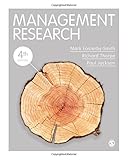Management Research
Material type: TextPublication details: Los Angeles Sage Publications 2012Edition: 4th edDescription: 371pISBN:
TextPublication details: Los Angeles Sage Publications 2012Edition: 4th edDescription: 371pISBN: - 9780857021175
- 001.42 EAS
| Item type | Current library | Item location | Collection | Call number | Status | Date due | Barcode | Item holds | |
|---|---|---|---|---|---|---|---|---|---|
 Book
Book
|
NIMA Knowledge Centre | 9th Floor Reading Zone | General | 001.42 EAS (Browse shelf(Opens below)) | Available | M0028332 |
1.Introducing management and business research Introduction The nature of management and business research What is management? Skills and resources for management and business research Levels and outcomes of management research Is management research distinctive? Conclusion Further reading 2.The philosophy of management research The philosophical debates Ontology: from realism to nominalism Epistemology: positivism versus social constructionism Linking ontology, epistemology and methodology Strengths and weaknesses of the main traditions Overviews of other philosophies 3.Designing management research Epistemology and researcher engagement Positivist research designs Constructionist research designs Case method and grounded theory Mixed methods Common design dilemmas Contributing to theory Contents note continued: Contrasting views on validity and reliability Research design template 4.The politics and ethics of management research Political influences on the research question Politics of access Ethics Utilization of research 5.Reviewing the literature What is a literature review and what is its purpose? Preparation for the literature review Elements of literature review Alignment with study context and approach Sources of information 6.Creating qualitative data Methods for qualitative data collection Collecting data through language Collecting data through observation Understanding data through interaction General concerns related to the collection of qualitative methods 7.Framing qualitative data Contents note continued: Analysing natural language data Content analysis and grounded analysis Computer aided analysis Social network analysis Discourse analysis Narrative analysis Conversation analysis Argument analysis Gaining knowledge through interaction 8.Creating quantitative data Sampling design Sources of quantitative data Questionnaire design 9.Summarizing and making inferences from quantitative data Summarizing and describing data Going beyond a sample 10.Multivariate analysis Multivariate analysis of measurement models Multivariate analysis of causal models 11.Writing management and business research The skills of writing The content of reports and dissertations Writing up the literature review Contents note continued: Outputs and evaluation Plagiarism Dissemination strategies Further reading.
There are no comments on this title.

